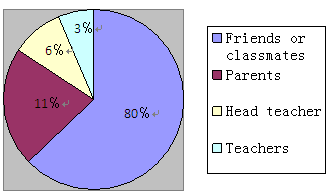题目内容
When you are in trouble,whom will you tell the problems to and ask for help? Someone has made a survey in a middle school.500 students were asked to choose one answer among friends or classmates,parents,head teacher and teachers.Here is the result.Please read the chart and try to get some information.

- 1.
Most of the students would like to talk about their problems with _________.
- A.friends or classmates
- B.parents
- C.head teacher
- D.teachers
- A.
- 2.
Less than a quarter of the students chose parents, the most possible reason is __________.
- A.parents don't love their children
- B.children don't trust(信任) their parents
- C.parents aren't able to give good advice
- D.sometimes parents and children can't understand each other
- A.
- 3.
According to the fact that only 9%of the students wanted to communicate with their head teacher or teachers,what is the best suggestion?
- A.The students should work harder.
- B.The students should listen to the teachers more carefully.
- C.The teachers should be more strict with the students.
- D.The teachers should pay more attention to the students' feelings.
- A.
- 4.
According to the article which of the following is NOT true?
- A.Only a little part(部分) of students ask their teachers for help
- B.Students trust parents more than classmates
- C.About 400 students will ask their friends or classmates for help
- D.All the students come from the same middle school
- A.
- 5.
According to the article we can infer(推断):
- A.we must be friends to them if we want the children to trust us
- B.Teachers can’t give students enough help
- C.Students have few troubles in school
- D.Students always tell their friends or classmates anything
- A.
ADDBA
试题分析:本篇短文的主要信息通过一个扇形统计图表达了出来,通过这个统计图我们可知孩子们最相信的是同学和朋友。从而启发家长老师应如何来与孩子们打交道。
1.通过图表我们可知有80%的同学喜欢和同学朋友谈论自己的问题。占大部分,故选A。
2.通过分析四个选项可知选D为最佳答案。有时父母和孩子们不能很好地相互理解。
3.选项ABC是大部分老师的通常做法,故老师需要注意到就是多注意学生的感受。故选D。
4.通过两个分数11%和80%的对比可知学生们更相信他们的同学。选项B描述与原文不一致,
5.通过分析可知孩子们最相信的是同学和朋友,我们应努力成为孩子们的朋友。选A。
考点:图表类阅读
点评:本篇短文的主要信息通过一个扇形统计图表达了出来,故阅读中一定要读懂图标信息,分析这些数据表达的含义,进行适当推理,完成阅读。
试题分析:本篇短文的主要信息通过一个扇形统计图表达了出来,通过这个统计图我们可知孩子们最相信的是同学和朋友。从而启发家长老师应如何来与孩子们打交道。
1.通过图表我们可知有80%的同学喜欢和同学朋友谈论自己的问题。占大部分,故选A。
2.通过分析四个选项可知选D为最佳答案。有时父母和孩子们不能很好地相互理解。
3.选项ABC是大部分老师的通常做法,故老师需要注意到就是多注意学生的感受。故选D。
4.通过两个分数11%和80%的对比可知学生们更相信他们的同学。选项B描述与原文不一致,
5.通过分析可知孩子们最相信的是同学和朋友,我们应努力成为孩子们的朋友。选A。
考点:图表类阅读
点评:本篇短文的主要信息通过一个扇形统计图表达了出来,故阅读中一定要读懂图标信息,分析这些数据表达的含义,进行适当推理,完成阅读。

练习册系列答案
相关题目